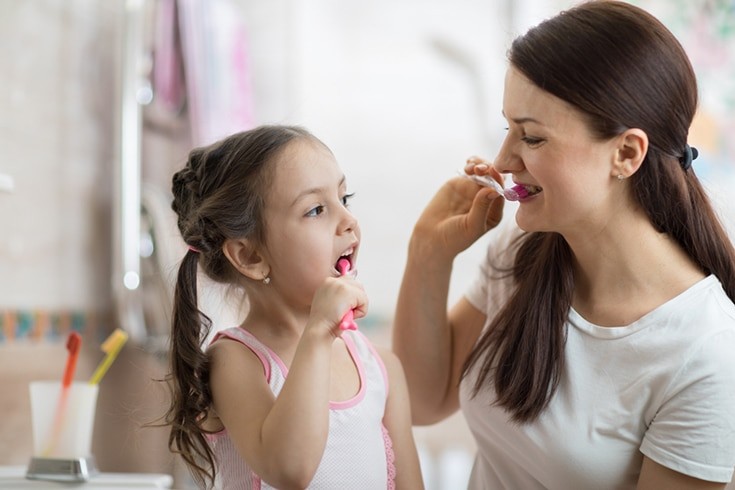
Building Healthy Habits: Oral Care Tips for Kids
A Healthy Smile is an Investment in Your Child’s Lifelong Well-being!
As a parent, you’re your child’s oral health champion, guiding them toward great habits from day one. This comprehensive guide provides fun, age-appropriate tips to keep their smiles bright, from those first baby teeth through their teenage years. Let’s make oral care a positive part of their routine and set the stage for a future filled with healthy, confident smiles!
Early Care is Crucial
Wipe Baby’s Gums Regularly – Keep their mouth clean for healthy teeth.
Baby Teeth Health = Strong Permanent Teeth – Early care is essential.
Habits for Healthy Smiles
Start brushing early (1-2 years old), twice a day for two minutes.
Floss by age 4.
Help kids until they can do it themselves (around age 8).
Don’t forget those back teeth!
Diet Matters
Healthy teeth love fruits, veggies, and whole grains.
Limit sugary snacks and drinks. Water is best!
Smart snacks: cheese, yogurt, and nuts.
Dental Visits Are Key
First dental visit by age 1.
Regular checkups ensure clean teeth, strong smiles, and a positive relationship with the dentist.
Parents as Oral Health Heroes
Kids copy you! Take care of your own teeth.
Make brushing and flossing fun quality time.
Supervise young kids for proper technique.
Early Dental Care: Foundation for Healthy Smiles
A child’s oral health journey begins long before their first tooth emerges. Healthy habits established in infancy lay a strong foundation for a lifetime of smiles. While baby teeth eventually fall out, their health greatly impacts the development of permanent teeth and overall well-being.
Starting Before the First Tooth
Clearing the Way: Wipe a baby’s gums with a soft, damp cloth after feedings to remove milk or formula residues. This reduces harmful bacteria and prepares the mouth for healthy tooth development.
Soothing Sore Gums: When teeth begin to push through, a gentle gum massage with a clean finger or cool washcloth can provide relief.
Baby Teeth Erupt: Brushing Begins!
When the first tooth emerges, it’s time to start brushing! Use a tiny smear of non-fluoridated toothpaste on a soft-bristled, child-sized toothbrush. Be gentle and clean both the teeth and gums.
The Role of Fluoride: A Key Ingredient
Fluoride is a cavity-fighting superhero! It helps strengthen tooth enamel and prevent cavities by aiding remineralization. Regular fluoride exposure from water, toothpaste, and sometimes professional treatments can keep this process going, protecting your child’s smile.
Preventing Fluorosis: Use only a tiny smear of fluoride toothpaste for children under 3. Avoid flavored toothpastes that may be tempting to swallow. Consult with your dentist or pediatrician about fluoride exposure.
Brushing & Flossing Like a Pro: Kid-Friendly Tips
Start building healthy brushing habits as early as possible! Introduce a soft-bristled toothbrush by age 1 or 2. Help your child brush for two full minutes, twice a day, ensuring all surfaces of their teeth and tongue are clean.
Flossing Fundamentals:
Introduce flossing at age 4. Help them clean between their teeth.
By age 8, most kids are ready to floss independently.
Targeting Problem Areas: Even with good brushing, some areas (especially back molars and inner lower teeth) are trickier to reach. Be sure to focus extra attention on these areas.
Superfoods for Super Smiles
Strong teeth love healthy foods! Fruits, veggies, and whole grains are powerful against cavities. Smart snacks like cheese, yogurt, and nuts are tooth-friendly choices that promote healthy smiles. Avoid sugary snacks and drinks, which feed bacteria that cause cavities.
Beware of Sugar and Starch
Sugary drinks, candies, and processed snacks feed bacteria that cause tooth decay. Limit these treats and always brush afterward.
Regular Dental Visits: The Best Smiles Start Early
The American Academy of Pediatric Dentistry recommends a first dental visit by age 1, followed by checkups every six months. These visits help establish a positive relationship with the dentist, spot potential issues early, and ensure clean teeth and strong smiles.
The Role of Parents and Caregivers
You are your child’s oral health hero! By taking care of your own teeth, you show them the importance of a healthy smile. Turn brushing and flossing into fun, quality time—singing silly songs or having a two-minute dance party can make all the difference.
Dental Clinic in Vancouver, BC understands that healthy smiles start young! Their pediatric dentistry team creates a fun, relaxing environment where kids feel safe and happy—think comfy chairs, friendly faces, and maybe even their favorite cartoons. From cleanings to braces, they offer everything growing smiles need, using the latest gentle techniques.
Conclusion
Taking care of baby teeth sets the stage for a lifetime of strong and healthy smiles. By following these tips and making dental care fun, you’re giving your child the gift of a beautiful, confident smile that lasts a lifetime. Remember, those pearly whites aren’t just for beautiful photos—they’re essential for chewing, speaking, and feeling confident!
FAQs on Oral Care for Kids
Q1: My child hates brushing their teeth! How can I make it more enjoyable?
A1: Turn brushing into a game! Try playing a favorite song for two minutes, making silly faces, or letting your child choose a fun toothbrush.
Q2: At what age should my child start to floss?
A2: Introduce flossing around age 4 and help them until they can do it independently, usually around age 8.
Q3: Are sugary snacks completely off-limits?
A3: Occasional sugary treats are okay, but focus on healthy snacks most of the time, and always brush teeth thoroughly after sugary indulgences.
Q4: When should my child have their first dental visit?
A4: The American Academy of Pediatric Dentistry recommends a first dental visit by age 1. Early visits help catch potential problems and establish a positive relationship with dental care.

